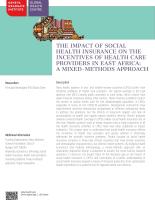PhD Co-supervisors: Prof. Jean-Louis Arcand and Prof. Vinh-Kim Nguyen
2nd Reader: Prof. Lore Vandewalle
Funding Organisation: Swiss National Science Foundation (SNSF), Doc.CH scheme.
Timeline: March 2021 – May 2024
Budget: CHF 276,004
Keywords: economics, ethnology, social health insurance, health care providers, incentive problems, mixed-methods approach, impact evaluation
Zhubin is an Affiliate Researcher at the Global Health Centre of the Graduate Institute of International and Development Studies. He is a Doctoral Candidate in Development Economics with a minor in Medical Anthropology at the Institute. See his profile.
Scientific abstract
Many health systems in low- and middle-income countries (LMICs) suffer from incentive problems of health care providers. The typical example is the high absence rate (35%) among public providers in rural areas, which results from weak financial incentives among other factors. These incentive problems restrict the access to quality health care for the disadvantaged population in LMICs, especially in times of the COVID-19 pandemic. Development economists have experimented incentive intervention programmes at different subnational levels to address the problems, but the effects of long-term neglect and lack of accountability on health care supply require systemic reforms. Recent progress towards universal health coverage in LMICs makes social health insurance one of the most feasible systemic tools at hands, however only a small proportion of all the health insurance schemes in LMICs have ever been subjected to impact evaluation. This project aims to understand how social health insurance affects the incentives of health care providers and assess whether it effectively addresses the provider incentive problems. Zhubin focuses on social health insurance schemes in three East African countries that have similar economic and demographic characteristics, but distinct health systems. By bridging health economics and medical anthropology, a mixed-methods approach with an exploratory sequential design is proposed to answer the cross-cutting research questions. In doing so, his project helps fill the literature gap on the impact of social health insurance in LMICs, and contributes to a better understanding of social health insurance beyond a means of financial protection from catastrophic health expenditure to a systemic tool to regulate health care delivery.
Collaboration
School of Public Health, Makerere University, Uganda
- In-depth/constructive exchanges on approaches, methods or results
- Research Infrastructures
Institute of Global Health Equity Research, University of Global Health Equity, Rwanda
- In-depth/constructive exchanges on approaches, methods or results
- Research Infrastructures
Department of Public & Global Health, University of Nairobi, Kenya
- In-depth/constructive exchanges on approaches, methods or results
- Research Infrastructures



